Table Of Contents
Tilers Place is reader-supported. When you buy through links on this page, I may earn an affiliate commission on qualifying purchases.
Best Tile Sealer Reviews For 2021
Tile Sealant Buyer’s Guide For All Natural Tiles
Its Time To Find The Best Tile Sealer For You
If you are thinking of using any form of natural stone tile in your home or tiling project then a quality tile sealer should be the first thing on your mind.
To protect the beautiful finish during installation and to maintain the stone tiles look for years to come, you need the best tile sealer available to protect your investment against everyday living.
This review of the best tile sealers for 2021 is here to help you select the right sealer for your tile choice and also highlight which kind of finish you can choose from. (Natural to glossy).
Lastly, I will point you toward the best prices for every tile sealer on review.
If you are looking for the best grout sealers – click here.
Click Here to Jump to the Best Tile Sealers Information Table.
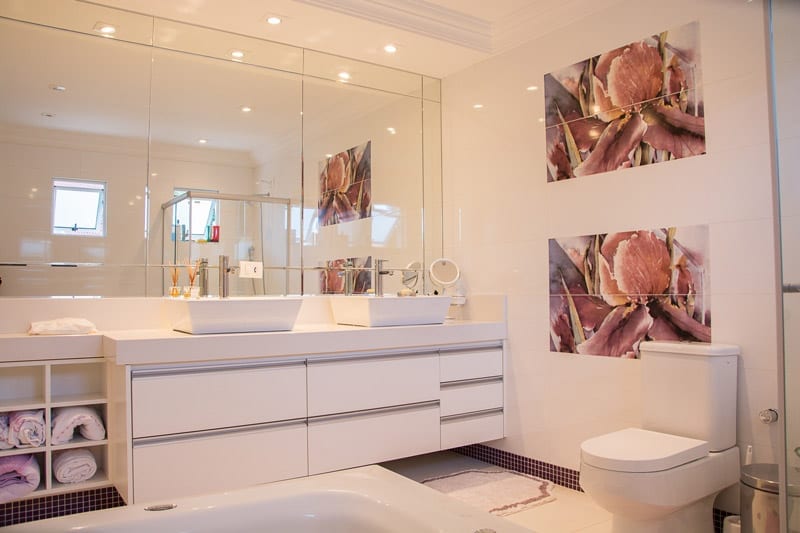
This best tile sealer guide will aim to clarify the confusion involved with tile sealants and explain which product will work best for your chosen material. From slate, travertine, marble and any other stone tile, there is a tile sealer for it.
Any mumbo-jumbo concerning penetrating tile sealers, oil or water-based tile sealants and any related terms will be clarified as well.
Let’s go seal some tile!
The Best Tile Sealers Information Table
| Name | Type | Rating | Use | Price |
|---|---|---|---|---|
Aqua-X Stone Sealer | Penetrating | 5 | All forms of natural stone tiles and unglazed tiles. | Check Price |
Aqua Mix Sealer's Choice Gold | Penetrating | 4.5 | Ideal for porous surfaces like sanded grout and travertine etc | Check Price |
Miracle Sealants - Seal & Enhance | Non-Penetrating | 4 | Perfect for natural stone. Enhance the color of stone and leave shine. | Check Price |
Stonetech Bulletproof | Penetrating | 4 | Ideal for the best stain protection for marble, granite and slate. | Check Price |
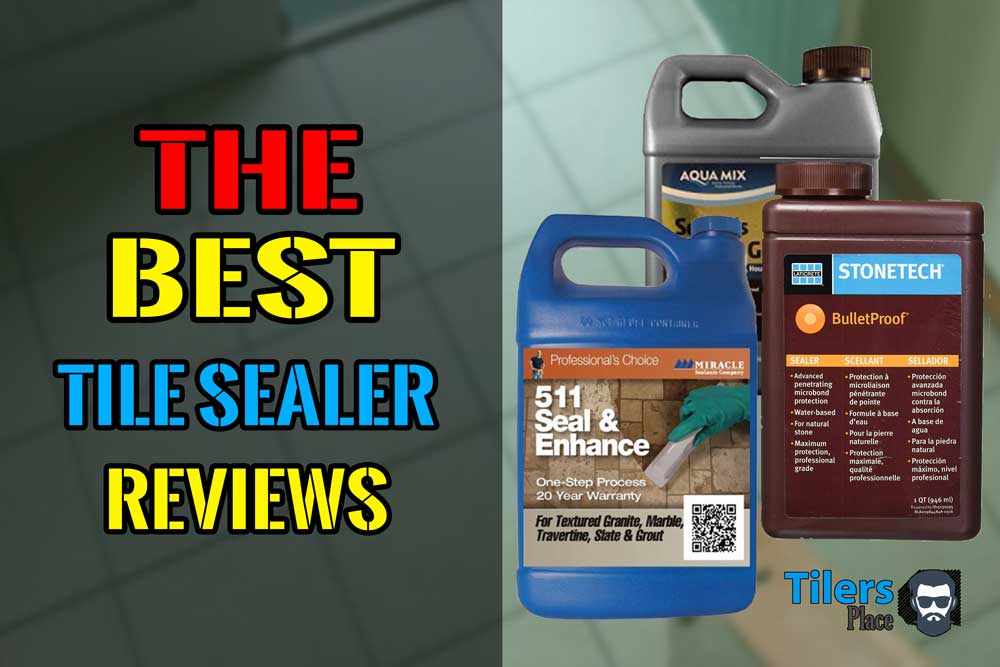
Professional Tiler’s Pick ✓
This Is An All Round Fantastic Tile Sealer. Suitable For ALL Natural Tiles, Indoors & Out. Leaves A Natural Sealed Look.
1. The Best Tile Sealer : Aqua-X – Stone & Clay Brick Sealer
The best tile sealer for all types of natural and manufactured tiles is Aqua-X Stone Sealer by Black Diamond Coatings.
It is a low odor, water-based, penetrating tile sealer suitable for sealing:
• All Types of Natural Stone Tile – sandstone, slate, quartz, marble, limestone, granite, bluestone / basalt)
• Manufactured Tiles – unpolished porcelain tiles, clay pavers, polished & unpolished concrete, terrazzo, encaustic tiles, terracotta.
It is safe to use for both exterior and interior tiles and has the best properties overall for every day and most common uses. Low Odor and VOC!
My name is Carl Anders and I have been tiling professionally for over 20 years in both the USA and England.
In that time I have sealed my fair share of grout, natural stone, cement tiles and have learned a thing or two about tile sealers in that time.
Today, I want to pass on my experience with tile sealers onto you. Helping you can make the right and proper decision when selecting a sealant for your next tiling project.
Before You Buy The Best Tile Sealer
Every tile sealer is made for a different purpose and will affect the end result.
For example, if you have a natural stone in the shower, you will require the best tile sealer for showers, one that can withstand standing water. Also, have a think about the finish.
Do you want a natural look or an enhanced “wet look” that makes the tile darker, shiny and overall looking like it’s been drenched in water. A natural tile like travertine marble will benefit greatly from a wet look tile sealer whilst something like terracotta would be better suited to a natural look.
Taking into account that there is no “best tile sealer” for every single use case, I have selected a range of tile sealers that best suit specific situations. All you need to do is find the one that suits your use and you are good to go.
If you are unsure about which tile sealer will work best for your application, I have provided a tile sealer comparison section below.
Below you will also find the best 3 overall tile sealers that can be applied for most situations and expected results.
Tile Sealer Comparison
Take a look at the image and see the differences between:
• Unsealed (no sealer at all – condition you get the tile)
• Natural Look Tile Sealer
• Wet Look Tile Sealer
As you can see, the differences between the unsealed and natural look tile sealer are virtually nil – hence the name “natural look tile sealer”. It dosen’t effect the look of the tile at all, however it does penetrate deep into the tile and form of protective barrier over it.
The wet look tile sealer creates a very striking effect on natural tiles, as you can see in this photo.
As the name suggests, it makes the tile look wet and it brings out the natural beauty of the tile. An added gloss or shiny effect is also added to the tile that further enhances the overall effect.
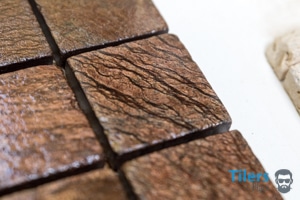
Tile Sealer Buying Guide
Understanding the differences is very important as it will help you avoid making a costly mistake.
Tile Sealer Rule Of Thumb
Use A Wet Look Tile Sealer On Wall Tiles
Use A Natural Look Tile Sealer On Floor Tiles
That’s an easy rule of thumb that I go by and it helps educate my clients when they ask which tile sealer I am going to use on their tiles. If you go by this rule of thumb, then you’ll be able to choose the right tile sealer every time.
Keep reading if you want to understand the reasoning behind this, alternatively, skip ahead and read my recommendations in the best tile sealer section.
Wet Look Tile Sealer
A wet look tile sealer is solvent based solution that forms a coating over the top of tiles. It’s consistency is similar to that of a wood varnish and produces a sharp odor.
Most wet look tile sealers create a moisture barrier that prevents the tiles from breathing, meaning that if water seeps in from beneath the tile (like in outdoor applications) an ugly white haze will appear on the tile. This is because the water has seeped to the top of the tile but is not allowed to escape.
This is nearly impossible to remove – believe me, I’ve tried.
You can avoid this mostly by sealing all sides of the tile before setting them but I’ve found it safer not to use it at all in outdoor floor applications.
Also, due to the tile sealer producing a visible layer on top of the tile, it can wear off due to floor traffic. This means areas with heavier traffic will begin to look matte and dull over time because the sealer has worn off. This is why I only use wet look sealers on wall applications where the sealer will not be worn off.
Backsplashes and feature tiles really benefit from wet look tile sealers and that’s what I use them on.
Natural Look Tile Sealer
This is the safest option and most protective. A natural tile sealer is more water based and has little to no odors, making it safer to use for sensitive people.
The natural look tile sealer penetrate deep into the pore of the tiles and also protects the surface of the tile from staining and mildew growing on the tile. It’s also ideal as a pre-sealer before tiling as it makes cleaning adhesive and grout smears super easy.
Whilst the overall look of a natural look tile sealer may be disappointing to some, the advantages provided really outweigh that.
Since the tile sealer is water-based, you also get more coverage from one bottle – making it more cost effective.
Pro Tile Sealer’s Choice
The Best Tile Sealer
Best Overall Choice In Tile Sealants
This tile sealer is ideal for a natural look without any added gloss/sheen and color change in your tiles.
1. Overall Best Tile Sealer:
Aqua-x – Stone Sealer
Black Diamond Coatings have created a great natural tile sealer that can also be used on clay bricks and is a great encaustic tile sealer.
It is a water based penetrating sealer that provides many years of protection and a natural finish. That means it will not affect the natural finish of your expensive tiles. No sheen, gloss or shine!
One aspect that really stands out with this sealer is it’s very high yield – up to 1000 sq/f per gallon per coat. That is outstanding and really makes this a cost effective solution for sealing large areas.
Application is very easy with either a sprayer or roller and there is no irritating odors. It’s one gentlest smelling tile sealers I have ever used.
Pros
• Natural look with no extra sheen
• No color change in grout or darker shades
• Suitable for all types of Natural Tile + Grout
• Moisture Barrier helps future cleaning of any stains
• Extremely low odor
• Suitable for Exterior/Interior Surfaces
Cons
• Requires multiple coats for best results
Best Sealer For Damp Areas
This tile sealer is great for porous tiles like travertine, all forms of granite+marble and is a great tile sealer for Cantera/Adoquin.
2. Best Damp Area Tile Sealer:
Aqua Mix – Sealer’s Choice Gold
Aqua Mix has been proudly producing quality tiling solutions and problem solvers for over thirty years and I have been using their products for nearly as long.
The Sealer’s Choice Gold is my go-to tile sealer for most everyday jobs. It provides a natural, non-sheen look to natural stone and tiles that doesn’t affect the final finish of the surface.
It is an impregnating sealer also, making it suitable to seal and protect ALL natural stone from oil and water based stains making it ideal for all areas of the home, from food preparation area’s to bathrooms and shower floors. It also dries very rapidly and has low odor – thanks to its water-based property.
Pros
• No color change in grout or darker shades
• Suitable for all types of Natural Tile + Grout
• Contains Microban® to combat mildew growth
• Penetrates dense, low porosity materials
• Protect’s against all stains
• Suitable for Exterior/Interior Surfaces
Cons
• Requires multiple coats for best results
• Will not prevent surface wear or etching from acids or caustic chemicals
Best Tile Sealer To Color Enhance
This tile sealer is designed to bring out details in your chosen tile whilst also enhancing the color. It leaves the desired “wet-look” which makes it popular for travertine tiles.
3. Best Enhancing Tile Sealer:
Miracle Sealants – Seal & Enhance Tile SEaler
If you are looking for the best tile sealer to enhance the look of your natural tiles and give it that wet look, then Miracle Sealants Seal & Enhance is for you.
Contrary to all the other tile sealers in this guide, Seal & Enhance Sealer aims to bring out colors by adding a “wet-look” and sheen to them.
This tile sealer is solvent based which makes it a thicker and heavier sealant in comparison to water based solutions – allowing it to work magic on natural stone. It’s a great slate tile sealer and it really brings out its color.
This is my favorite to use as a pre-sealer as I know it will protect the precious natural stone from any grout and adhesive stains during installation. After grouting I follow it up with a supplementary coat to really bring out the color.
511 Seal & Enrich is also rated for interior/exterior use and is freeze/thaw resistant.
Pros
• Adds breath-taking beauty and depth to natural stone
• Long-lasting protection in all conditions
• Easily one of the better color enhancing sealers out there.
Cons
• Can cause hazing if the surface is not fully dry.
• Darkens grout by a shade
• Slower drying time – Longer wait between coats
Best Tile Sealer For Stain Prevention
Stonetech Bulletproof is the tile sealer that tile setters go to when they need the best in stain prevention. It’s so good that most tilers won’t use anything else!
4. Best Stain Resistant Sealer:
Stonetech – Bulletproof
Want the ultimate peace of mind that your expensive natural tiles will not suffer from staining in high traffic areas?
Laticrete has created the ultimate in stain preventing tile sealers, one that is so good that many tile setters the world over swear by it. Imagine a tile sealer that can withstand every oil & water based stains, including tire marks!
Apart from extreme stain prevention, it is a natural look tile sealer that will not alter the look of your natural tiles. It leaves an almost invisible layer on your surface that beads up stains and stops liquids penetrating it.
Pros
• Ideal for Countertops
• Excellent track record
• Backed by tile setters everywhere
Cons
•Won’t enhance the look of a surface.
Tile Sealer Question – When Do I Use A Tile Sealer?
Ideally, you want to use a tile sealer before any work is done with the tiles. That means sealing them with at least two coats before the tile setter begins installation. This helps prevent any staining during the installation process and helps prevent glue and grout entering the tiny pores of the tile.
After the tile has been set and grouting is completed, it’s good practice to apply a further coat on top of everything. Keep applying coats until the water beads up.
On a standard porcelain tile, that job is taken care of by the glaze, or that beautiful shiny part on the surface of the tile that is the pattern.
Your natural tile, however, is not impervious to water, mold & mildew due to it being a natural product that hasn’t been kiln fired like a regular tile. This makes it full of tiny holes that absorb dirt, stains and the worst of them all – red wine!
All natural stones like granite, sandstone, marble, travertine, slate are susceptible to this. This means that if you are using these materials, it is best to get them sealed with a quality natural tile sealer before any work is done.
So to translate this into terms you want to hear:
If you are installing natural stone tiles or counters in your home, you require a quality sealant to prevent any oil and water based stains, easy cleaning and maintain the finish of your expensive stone.
To achieve a natural look: Use Aqua Mix Sealer’s Gold
To achieve an enhanced color, always wet look: Use Miracle Sealants Seal & Enhance
If you are wanting to maintain the look of your tiling installation, prevent mold & mildew build-up and make tile maintenance a breeze, then also apply the sealer over your tile.
Tile Sealer Question – What Is A Tile Sealer/Tile Sealant?
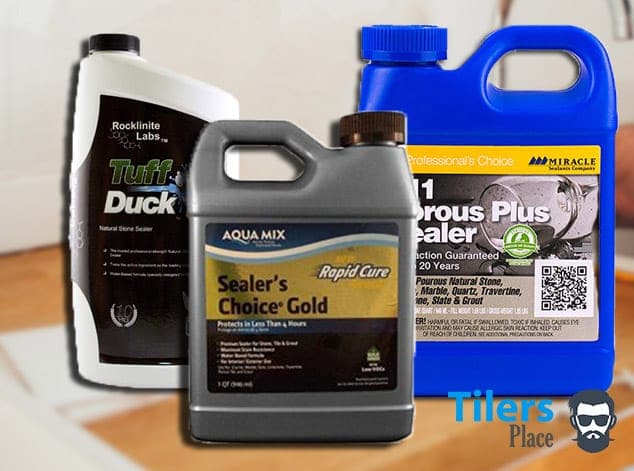
A tile sealer is best described as a water or solvent based solution that is designed to create a protective layer between the surface of a tile and external dirt, stains and liquids.
This is achieved by using polymerized silicone resins and additional polymers that penetrate the porous surface of natural tiles and forms a barrier against external contaminants while still allowing the natural color and texture of the protected surface to show through.
The water or solvent that carries this resin is there for ease of use and to allows the tile sealer to penetrate the surface and all of its numerous cores. With time, the carrying agent evaporates into the air and leaves only the resin behind.
“This is why multiple coats of a tile sealer are needed; because one coat of tile sealer is not enough to fully cover an area and create a thick enough layer that will endure living conditions and stains as the protective agent is diluted with the liquid based carrier.”
In Layman’s Terms:
A tile sealer is the best way to protect your tiles. It is a magical liquid that enters tile and protects it against everything. It goes on wet and dries up, leaving your tiles sealed.
How Do I Use A Tile Sealer/Tile Sealant?
Depending on the scale of work you can either use a mini paint roller for sealing tiles or a sponge pad. A soft haired paint brush can also be used. I found the paint roller to be the best tile sealer applicator for most natural tiles.
How To Apply Tile Sealer In 3 Quick Steps:
Step 1: Make sure to clean your tiles thoroughly before applying any tile sealer. You do not want to trap any contaminants underneath the surface of the sealant.
Step 2: Apply your chosen tile sealer that best fits your needs to the surface using your applicator of choice. Aim to go in one direction only to remove smudge marks and build-up of product. Try to cover 100% of the surface. There should be a thin layer sitting on the surface.
Step 3: Allow the tile sealant to sit on the tile for at least 5 minutes and then use a clean rag to buff away any excess left on the tiles. If you are sealing natural stone, you will likely need to apply a further coat of tile sealer before that time as it would have fully penetrated the surface. After the second coat, wait for 2 hours and test if water penetrates the surface. It should bead up and not soak into the tile. If it does, apply further coats until desired result is achieved.
How Does A Tile Sealer Benefit Me?
Deciding to seal your tiles will only give you benefits with little to no drawbacks.
Some benefits from sealing include:
• Best Stain Resistance
• Easier Maintenance
• Enhanced color (on natural tiles)
• Higher degree of Waterproofing
• More hygenic wet areas.
Tile Sealer F.A.Q
If your question is not answered, please leave a comment below! I’ll answer it to the best of my knowledge and your question might be featured in an updated version of this Tile Sealer Buyer’s Guide 🙂
Is tile sealer necessary?
Yes, tile sealer is necessary if you are using any unsealed encaustic tiles or natural tiles like travertine and marble.
It will also protect the tiles from everyday staining and day to day living.

Can I Grout Natural Stone With Epoxy Grout? Will The Grout/Tile Sealer Protect It?
Generally, the answer is no. All natural stone tiles are created/treated differently and have various degrees of porosity. Highly porous stone can absorb the epoxy grout resin through the edges of the stone tile, leaving a picture frame effect where the outer edges are darker. This color change is irremediable and will stay there for the life of the tile. If you want to use epoxy grout on natural stone, its best that you apply a quality tile sealer to all sides of the tile before installation and test it first before proceeding. Without prior testing, you may end up with a multi-thousand dollar tile installation that is ruined forever.
Question: How do you seal porcelain tiles?
Porcelain tiles do not require sealing as they come with a factory glaze that is 99.9% waterproof and do not allow water or anything to penetrate it. In terms of no water absorption, porcelain tiles are the best.
There are, however, some forms of unsealed porcelain tiles that could benefit from a light coat of a tile sealer. These tiles are very rare and you’ll be warned of this from the tile seller upon purchase. Its best to ask the salesperson while buying your tiles if you are unsure.
Best Tile Sealer Conclusion
Overall, the Aqua-X natural tile sealer was the best all-round sealer as it offers a universal scope of applications and delivers a professional result.
It is a very versatile stone sealer that is very easy to work with and has no offending odors that can irritate some people. Knowing I can safely use a tile sealer in a client’s home is a big bonus for me.
It is also very competitively priced for a quality product which really makes a difference in larger jobs where I require a lot of it. Lastly, it is rated for commercial work as well meaning it can withstand high traffic areas which just seals the deal for me. You can read my stand-alone review of Aqua-X 33 Stone Sealer here.



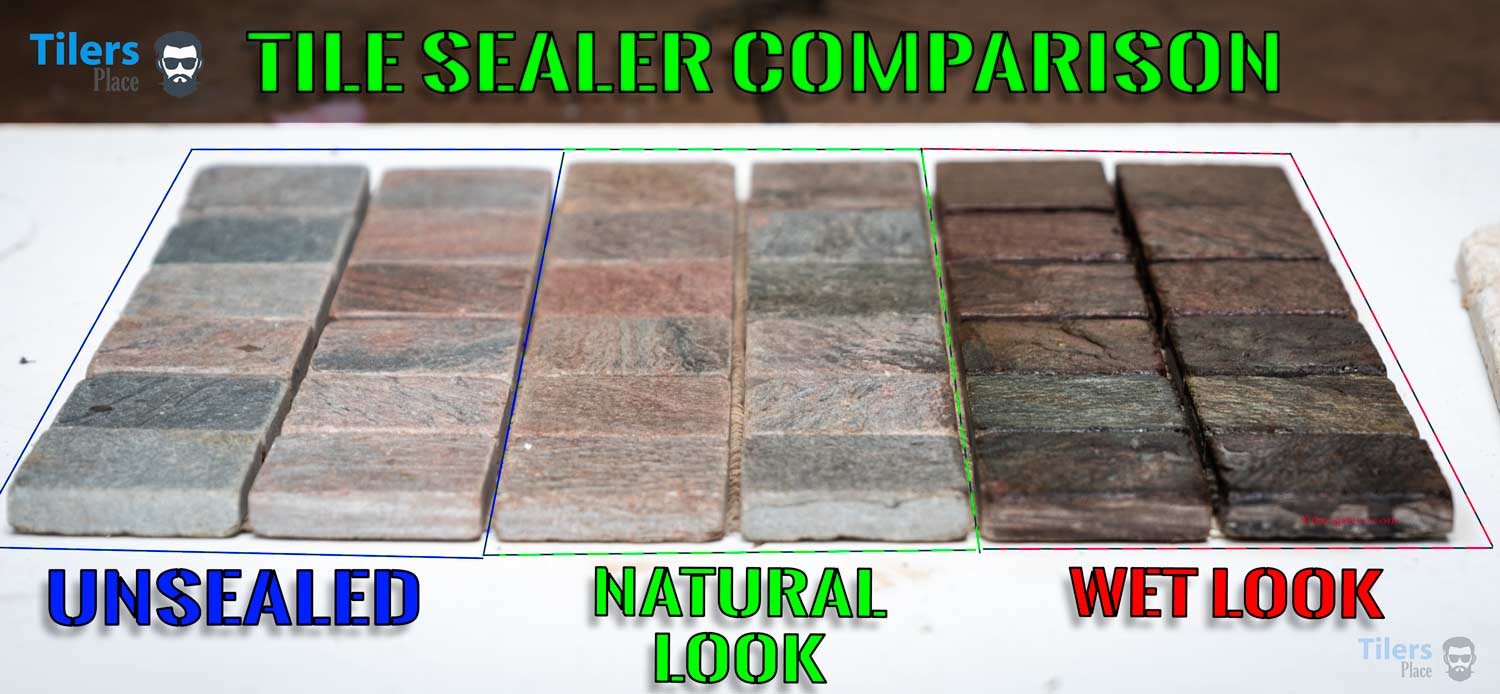



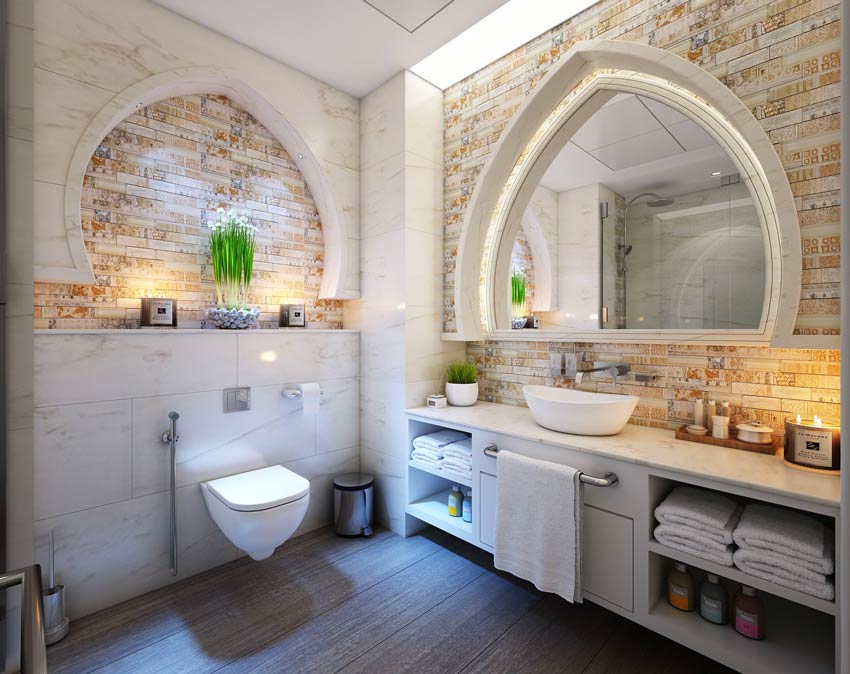
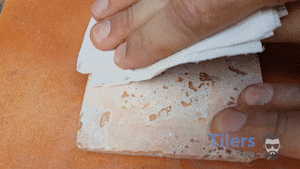

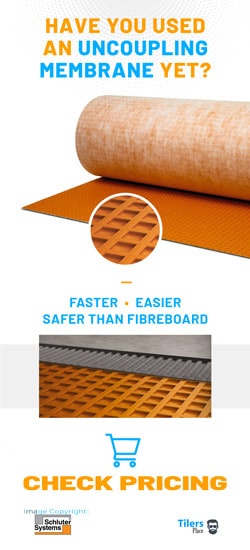


Hi Carl – I have a piece of black slate at the bottom of my fireplace on the floor in front, don’t know what that would be called. Anyway it is dull and dingy and I was wondering what you would recommend to make it look better. I have cleaned it thoroughly but it is dull. Thank you
Hi Lisa,
You can use any type of sealer for your slate, just depends on what kind of look you’d like to achieve. If you scroll up, there’s a photo of mosaic stone tile with two different tile sealers applied, an enhancing “wet look” sealer and a natural sealer that slightly darkens the color but leaves it matte and looking natural.
Wet look sealer: MIRACLE SEALANTS – SEAL & ENHANCE TILE SEALER
Natural look sealer: AQUA-X – STONE SEALER
If you really want to jazz up your slate, then the wet look sealer would be your choice.
Please let me know if you’d like any further help before making a decision. Thanks for the question and visiting my website 🙂
Hi Carl.
We have slate floors in our mudroom and front hall and powder room. They have not been sealed and are about a year and a half old.
What product would you recommend we use for 1. to clean the slate and grout. 2. bring out the vibrant colors in the slate. 3. can we use the same product to protect the tile and grout. Would Miracle 511-Seal & Enhance be a good product? Can that be used on the grout also? I am really confused on what product to use to clean the grout and tile before sealing it.
Thank you in advance for your help. I’ve been looking for someone to help me without trying to sell me their product and or services.
BTW we did the job ourselves. Lessons learned there.
Hi Kathryn,
Thank you for the question and visiting my site.
Yes, you can use Miracle 511 for both the slate and grout – it has been designed for such use. Your grout may look a bit shiner than usual but I’ve never had a complaint about it. It works/looks best on more gritty, sanded grout but it will work well on smooth grout as well.
The Miracle 511 will do as advertised: “seal the tile and enhance the color”. I call it a “wet-look” which means it’ll always look wet. If you wet your slate, you should get an idea how it’ll look.
In terms of cleaning the surface before sealing, it really depends on how dirty your tiles and grout is. If you want to be sure and get a nice proper clean, a product like Marble & Tile floor cleaner by Black Diamond should be more than enough. It’ll provide a nice deep clean, is easy to use and most importantly, it’s safe to use on slate. As an added bonus, it’s safe to use on sealed surfaces as well, so after your slate and grout is sealed, you can clean them safely with this product and it won’t remove the seal.
After you’ve cleaned the floor, make sure the slate is properly dry before applying sealer. I’d give it atleast 24 hours and then a proper vacuuming before sealing. If you have one, leave a de-humidifer in the rooms. This is to prevent white ghosting appearing on your slate from moisture popping up underneath the sealer and ruining the cure.
I hope that helps clarify some things, please let me know if you have further questions.
If I Want to paint a design with acrylic paint of a few slate tiles and then put in my back patio, could I still use these dealers?
Hi Amy,
Thanks for the question.
That’s a very interesting question!
Painting slate tile and then sealing them is something I have never seen or dealt with before. Since you’ll be using them outside, you’ll need something to seal the paint so it doesn’t wash off in time. My best suggestion would be to first test one tile out before committing to the project. Paint something on one tile and then seal it with a solvent based sealer like MIRACLE SEALANTS – SEAL & ENHANCE TILE SEALER. Use a couple coats so it’s nice and thick. Once it’s all dry, try running some water over it and see what happens. It should lock in the paint and not let it run, but it’s best to test it.
Alternatively, an oil based paint should hold up better than acrylic.
Hi Carl. Very informative article. Thank you!
I have question as I am still not sure what sealer to use. I just purchased handmade tile for my back splash in the kitchen. It is a ceramic tile he orders, and then the he pours liquid copper over it and then a blue patina is applied. It then is glazed with liquid glass. I am not sure what sealer to use in this case. Can you guide me in the right direction? Thank you so much!
Hi DiAnn,
Thank you for the visiting and leaving such an interesting question!
Wow, these tiles certainly sound very unique and beautiful. My first thoughts would be to reach out to the creator of the handmade tile and ask them whether they have any recommendations on which tile sealer they would recommend. Failing that, I’d go with the safest option and use a water-based tile sealer. One that won’t leave a shiny, wet-look film on it. Something like AQUA MIX – SEALER’S CHOICE GOLD would be a safe bet.
I hope that helps, please let me know if you have any further questions.
Thank you Carl! I did in the meantime ask him about this and he first suggested a sealer or beeswax as that is what some had used. After pressing him further about what kind of sealer, he suggested I use a very fine steel wool and gently buff the tile , then use a metal sealer I thought that was intriguing and am still not sure I understand this gentleman’s suggestion, and uncertain how this is going to turn out. I will let you know which way I went. I thank you for your recommendation!
We have purchased a home that is approximately 6 years old. It was a vacation home and not used much. The owner has told me the tile in bathroom is “ slate supreme winter”. We are tile challenged. Is this a glazed tile and why do I feel like my feet are dusty even though I’ve cleaned several times. The water test did not soak in the tile but did on grout. What are your suggestions? Thank you for any info!
Hi Nonie,
First of all, congratulations on purchasing your home! I bet it’s a very exciting time for you 🙂
Definitely sounds like you have a weird situation on your hands, I personally have not worked with this tile before but the chalky feeling may be built into the tile. This could be a “non-slip” surface added specifically to the tile to make it safer in wet areas. If you have cleaned them multiple times and they’re still feeling chalky, it could be that. If this chalky feeling is really bothering you, you can always call in a professional tiler to take a look for you. It may be a anti-slip coating that was applied to the tiles as well.
Since they are not absorbing water, you can just seal the grout if you wish. Any grout sealer will do the trick, I enjoy using Aqua-X grout sealer, but you can use any I talk about in my grout sealer article.
We would like to use a colored ceramic tile in an outdoor patio installation but have been told that porcelain is a better choice. Is it possible to seal ceramic tiles so that they are more impervious to moisture penetration and freezing and cracking problems?
Hi Michael,
Unfortunately no amount of sealer will change the properties of the tile. A tile sealer is more about stain protection and color retention rather than granting it water and frost resistance. If your patio is under an awning and away from rain, then you could get away from it, otherwise I’d avoid it. Ceramic tile is prone to absorbing water and holding it within itself. This makes it soft and prone to damage and discoloration. If the ceramic tile you have in mind is a fancy and unique design, it would be a shame to see it be disfigured and ruined by the elements.
Maybe you can compromise and use that tile in your indoor entrance way and find a porcelain tile for the patio area? That way you can still use the ceramic tile and enjoy it, just in a different area of the home.
Hope that helps,
Carl.
Great info Carl. The 511 Seal & Enhance sounds perfect for my pebble shower floor, which has been sealed once after installation a year ago. Will the Black Diamond Marble and Tile Cleaner be ok on the pebbles? Do you have an opinion on the Dawn/vinegar homemade cleaner? One suggestion…..there are several possessive words (apostrophe + s) on your site when they really should just be plural (“s” with no apostrophe), e.g., Pro’s and Con’s should just be Pros and Cons. Here’s another example: “… making it ideal for all areas of the home, from food preparation area’s to bathrooms and shower floors. It also ….” (note the second use of area’s). Sorry to be so nit picky but I’m a copy editor and can’t help it!! Truly, it’s a sickness…
Hi Sharon,
Thanks for visiting and for the interesting question.
The Black Diamond Cleaner should be fine for your pebbles and a good way to prepare your surface before resealing. You can also use this product from Aquamix that cleans and applies a thin coat of sealer in one go. (True wizardry!) The dawn and vinegar cleaner is okay for most uses, it shouldn’t affect the grout like a bleach would.
The main concern with resealing with a solvent-based sealer like 511 is to make sure the surface is bone dry before applying. Like 100%. No moisture in the shower pan or anything. This is to prevent clouding appearing underneath the sealer which is very ugly and very tough to remove. I’d avoid using that shower for at least a week and let the shower pan dry out properly, both on the surface and underneath the pebbles, then apply a test patch to one area and see if it’s okay to continue.
Alternatively, you can use a water-based sealer like the Black Diamond or Aqua Mix Sealer’s Choice Gold which will not cloud up. Of course, they sadly do not create such a beautiful finish as 511 does.
Haha, thank you for the complimentary spell check! I will be sure to implement those on the page. Don’t read any more of my articles as I’m sure the terrible mistakes will drive you crazy! It’s pretty easy to see why my teachers never liked me, I was far from a star student and it shows!
Hope that helps and good luck for the project.
Carl.
I have ceramic tile 8×39 (light to medium tan pattern) on the floor and then used the same tile in a remodeled shower walls. What is the best sealer to use? Esp on the shower walls. Would like a wet look.
Hi Michael,
If your ceramic tiles are polished or glazed, you won’t be able to apply a tile sealer to them. The sealer will form a film on top of the tile and wear off very quickly. The idea of a tile sealer is predominately for natural stone tiles that are porous and will absorb the sealer into the body of the tile. Ceramic and porcelain tile are fired in a kiln and have less water absorbance than a natural rock.
Sorry I couldn’t provide an answer that would please you, but I’d hate to lie and make you waste your money in these difficult times.
Regards,
Carl.
I just installed a cement tile that is a mate finish that i want to keep.
What sealer do you recomend to keep the mate finish no shine?
Hi Billy,
Either AQUA MIX – SEALER’S CHOICE GOLD or STONETECH – BULLETPROOF should work great for your cement tiles. They are both water-based and are designed to retain the original look of the tile whilst protecting it against stains.
Hope that helps.
Carl. I have stuffed up big. For starters, Did not remove excess grout quick enough. Then tried to use a chemical to do a quick fix.
Now the porcelain tile is lighter than it should be.
Is there a sealer than will darken the tile.?
Alternative is going to be to rip it all off and start again
Hi John,
Is the tile in question a porcelain tile or a natural stone tile?
Did you use a grout haze remover on the tile or just a household chemical?
It sounds like the grout haze is still on the tile and giving it a lighter color. Applying a sealer will just seal in that haze and make the whole problem worse! I recommend you get a specialist grout haze remover first and use that to get rid of as much of the haze as possible. These products are professional grade and should do the trick. This product from Fila should do the trick but you can try and see what your local tile store has as well.
Hopefully that helps, let me know if you have any further questions.
Thank you for your informative article,
I am in the process of renovating my house, and I’m replacing the kitchen floor with pre sealed Mission Red Saltillo tiles. I have been told that it’s a must to use a top coat oil based sealer after installation, but I can’t find any sealer that it’s not either water based, or says it’s for unsealed tiles.
Do you have a recommendation?
Hi Mattie,
Yes, it’s quite an obscure sealer for sure! It’s very specialist and sadly not as easy to find like most other sealers. I have managed to find you two manufacturers that produce a product especially for Saltillo Tiles.
The first one is exactly what you want, oil-based and perfect for Saltillo. This is Mex-Seal from Sparks. Online ordering is pretty easy but due to EPA restrictions, they cannot ship to a range of states. Hopefully these don’t effect you.
The second one is AGG Sealer, it’s solvent based but does come highly recommended by tile setters. It provides a deep gloss finish that’s made for softer tile like Saltillo.
I hope that helps and you manage to find the sealer you want.
All the best for the renovation, I bet your floor will look stunning once it’s completed!
Thank you very much for your help.
Thank you for all your information.
I have gorgeous soapstone counters that I need to seal.
I know traditionally oil or wax is used, but I do NOT want to change the color of the stone, which is a beautiful dark green-grey with multi depths and contrasting veins.
Is there a sealer that will do what I want?
Hi Matthew,
From my research, the safest sealer to use on soapstone without effecting the finish would be Dupont Bulletproof. That should keep the stone a lighter shade as opposed to the darker one which is achieved by oiling it, etc.
Do note that you’ll need to be diligent with your reapplication as soapstone isn’t very porous and won’t absorb the sealer as well as other stones. That means it’ll wear off much faster in areas that are heavily used.
Apart from that, you shouldn’t have any issues.
Hope that helps!
Hi, thanks for your article. We built a home I took longer than expected. Some grout and adhesive was left on the tile for a long time. Before move-in we did a deep cleaning in which we noticed the problem and addressed it with haze removers and acids we found in Home Depot and Lowe’s. Some of it remained. We do notice that when we mop the floors, while it’s wet it is not noticeable. So we are considering applying a wet look sealer, but I noticed in a previous comment you recommended against it. Like I said, it looks like when the floor is wet, the haze disappears, much like when you have dry ashy skin, and you wet it or apply a cream. What would you say? Please help!!
Oh, I forgot to mention that it is a Matte porcelain tile that looks like wood.
Hi Paola,
You are on the right track with the cleaning solutions and acid that you have been using to clean the floors.
With old adhesive stains, the only thing to do is use a strong acid like hydrochloric or muriatic acid and scrub them with brushes or brooms. This should remove them.
If that fails, you’re final option would be to hire professional tile polishers to come in with their big machines and give the tiles a thorough cleaning.
You definitely want to avoid applying a wet look sealer to the tiles as it’ll form a plastic-like layer on top of the tiles. This will wear off quickly and unevenly and make a bigger problem than you have now.
Hope that helps,
Carl.
I have an outdoor table from Costco with a ceramic tile top. I applied a stone sealer that was for natural stone and it looks terrible. The company sent me a cleaner that has pretty much taken it off. What do you suggest I use to seal it? Should it not be for a natural stone?
Thank you,
Terri
Hi Terri,
Ceramic tile cannot be sealed as it’s glazed and will not hold any sealer. Unless your table is a fired clay/natural stone, applying a sealer will never come out right.
Hello Carl,
Great article, we have just laid a large porcelain tile patio – matt finish unprotected look. We have used the recommend cleaners (Fila – Deterdek Pro) to remove all the grout residues etc and now we would like to seal it all up. The company has recommended Fila – Dirt Repellent but I have also seen ‘Ultimate stone tile sealer’, is there a preference or a better alternative?
Hi Dean,
Fila Dirt Repellent is specifically made for your type of tile and conditions. Ultimate stone sealer is more suited for natural stone tile like marble, granite, and not porcelain tile.
I would definitely go with the recommended product, the company made an excellent call.
Good luck with your project and thank you for visiting.
Carl.
My house in Mexico, which is just 2 years old, has a flat roof tiled with unglazed saltillo tile. I think the builder put one coat of cheap sealer on the tiles and, as you can easily imagine, the tiles are deteriorating. What kind of sealer can I use to seal that tile now? I assume the the sealants you recommended in your fine article are primarily for interior use. Thank you.
Hi Carl, I have a back patio covered with porcelain tile. It is about 1,500sqft. Can I just spread sealant on it and let it air dry?
Hi Omar,
If you are talking about spreading the sealant over the tile and grout – I would NOT do it. The sealer will not absorb into the porcelain tile, it will just create a brittle glaze over the top. This will wear off quickly and unevenly creating a hideous look to your overall patio. Imagine skin pealing after a sunburn. That’s how it’ll look.
I understand you’d like to save time with such a large area however there’s no shortcut sadly. Divide the patio into sections and aim to cover one section a day or every weekend. You’ll get it done in no time 🙂
Hi Carl,
We purchased our home 1 year ago and the home was built in 2016.
The master bathroom shower has slate walls and a slate floor. We recently learned that the slate nor the grout has ever been sealed.
Due to the soap scum buildup we have just used a muriatic acid to clean the floor of the shower and it seems to have done the trick.
The slate walls seem to look ok. I am assuming because they do not get battered a couple times a day with direct water, shampoo, conditioner, body soap, etc.
What sealer would you recommend using in a shower with slate walls and slate floors?
Is there any other preparations to the slate tiles or frout that should be done before sealing?
They do sell a couple different types of grout sealer applicators. The two that I have used/seen both come as little bottles. One with a small brush on the tip and the second has a little wheel on the end.
They both work okay to conserve your wallet on sealant. Especially if you need to do a large area with multiple coats. Its good to have extra to reapply every 5 years or so( some longer,). Its also good to save the bottle to help you remember later what to buy again.
If you have a steady hand and trigger finger like me. You can also put it in spray bottle then rotate the tip to stream. Get really close to the grout and pull the trigger slowly. Filling up the grout joints and trying to not overfill them. Similar to applying silicone caulk with a tube if you get good enough that way you can apply it with minimal to almost no clean up. (Alternatively you could use the spray or mist setting if you are doing it on a backsplash with lots little glass tiles. As the sealer tends to come off the glass fairly easily.) But other types of ceramic or porcelain the less you get on them the less cleaning you have to do after. If you happen to have a car buffer with a clean terry cloth on it will help save your elbow. If you have a large area or applied sealer too generously,or too big an area, and/or dried up on you too fast( Temperature and humidity also play a factor on the sealers drying times as well.). Inorder to remove the haze from the excess sealer. For buffing on ceramic and porcelain tiles that has dried ( warning of you use the buffer with terry cloth on stone it can polish them and it can also polish the sealer as well if enough coats are applied , So if thats not the look you want, then dont use a buffer on a matte finished stone.Only some old fashioned elbow grease is recommended).